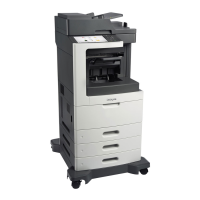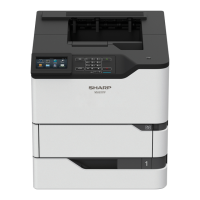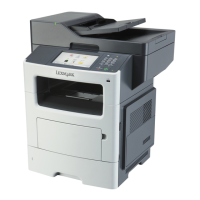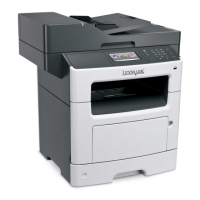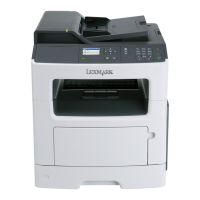Scanning
Scanning to a computer
Before you begin, make sure that:
•
The printer
firmware
is updated. For more information, see
“Updating firmware” on page 14.
•
The computer and the printer are connected to the same
network.
For Windows users
Note: Make sure that the printer is added to the computer. For
more information, see
“Adding printers to a computer” on
page 14.
1
Load an original document into the automatic document
feeder or on the scanner glass.
2
From the computer, open Windows Fax and Scan.
3
From the Source menu, select a scanner source.
4
If necessary, change the scan settings.
5
Scan the document.
For Macintosh users
Note: Make sure that the printer is added to the computer. For
more information, see
“Adding printers to a computer” on
page 14.
1
Load an original document into the automatic document
feeder or on the scanner glass.
2
From the computer, do either of the following:
•
Open Image Capture.
•
Open Printers & Scanners, and then select a printer. Click
Scan > Open Scanner.
3
From the Scanner window, do one or more of the following:
•
Select where you want to save the scanned document.
•
Select the size of the original document.
•
To scan from the ADF, select Document Feeder from the
Scan Menu or enable Use Document Feeder.
•
If necessary,
configure
the scan settings.
4
Click Scan.
Faxing
Setting up the printer to fax
Setting up the fax function using analog fax
Notes:
•
This feature is available only in some printer models.
•
Some connection methods are applicable only in some
countries or regions.
•
If the fax function is enabled and not fully set up, then the
indicator light may blink red.
•
If you do not have a TCP/IP environment, then use the
control panel to set up fax.
Warning—Potential Damage: To avoid loss of data or printer
malfunction, do not touch cables or the printer in the area
shown while actively sending or receiving a fax.
Using the Settings menu in the printer
1
From the home screen, touch Settings > Fax > Fax Setup >
General Fax settings.
2
Configure the settings.
Using the Embedded Web Server
1
Open a web browser, and then type the printer IP address in
the address field.
Notes:
•
View the printer IP address on the home screen. The IP
address appears as four sets of numbers separated by
periods, such as 123.123.123.123.
•
If you are using a proxy server, then temporarily disable
it to load the web page correctly.
2
Click Settings > Fax > Fax Setup > General Fax Settings.
3
Configure the settings.
4
Apply the changes.
Setting up the fax function using fax server
Notes:
•
This feature lets you send fax messages to a fax service
provider that supports e
‑
mail receiving.
•
This feature supports outgoing fax messages only. To
support fax receive, make sure that you have a
device
‑
based fax, such as analog fax, etherFAX, or Fax over
IP (FoIP),
configured
in your printer.
1
Open a web browser, and then type the printer IP address in
the address field.
Notes:
•
View the printer IP address on the home screen. The IP
address appears as four sets of numbers separated by
periods, such as 123.123.123.123.
•
If you are using a proxy server, then temporarily disable
it to load the web page correctly.
2
Click Settings > Fax.
3
From the Fax Mode menu, select Fax Server, and then click
Save.
4
Click Fax Server Setup.
5
In the To Format field, type [#]@myfax.com, where [#] is
the fax number and myfax.com is the fax provider domain.
Notes:
•
If necessary, configure the Reply Address, Subject, or
Message fields.
•
To let the printer receive fax messages, enable the
device
‑
based fax receive setting. Make sure that you
have a device
‑
based fax
configured.
6
Click Save.
5
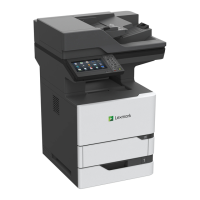
